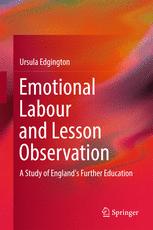

Most ebook files are in PDF format, so you can easily read them using various software such as Foxit Reader or directly on the Google Chrome browser.
Some ebook files are released by publishers in other formats such as .awz, .mobi, .epub, .fb2, etc. You may need to install specific software to read these formats on mobile/PC, such as Calibre.
Please read the tutorial at this link. https://ebooknice.com/page/post?id=faq
We offer FREE conversion to the popular formats you request; however, this may take some time. Therefore, right after payment, please email us, and we will try to provide the service as quickly as possible.
For some exceptional file formats or broken links (if any), please refrain from opening any disputes. Instead, email us first, and we will try to assist within a maximum of 6 hours.
EbookNice Team

Status:
Available4.6
40 reviewsThis book presents research on emotion work and the emotional labour of teaching and learning based in England’s further education sector, where an increasing emphasis on marketised systems means accountability and audit cultures have become embedded within everyday teaching practice. Uniquely, this book explores micro-level issues of the managerial policies relating to classroom lesson observations as well as the profoundly emotional, philosophical aspects of these situations, which research asserts cause stress and anxiety for many staff.
Drawing on theoretical psychosocial concepts exploring the interplay of hidden or ‘underground’ micro and macro elements of teaching and learning contexts, the book illuminates how the presence of an observer fundamentally alters the dynamics of a classroom. The author argues that it is not necessarily the performativity that creates the stress and anxiety in an observation but the individual’s perception of this performativity and how it relates to a wider consideration of their emotional labour in the classroom. For this reason, the book puts forward a case for ending the formal, graded method of lesson observations in favour of a developmental, holistic approach that is sensitive to the emotional nuances of the individuals involved as well as the social and historical contexts of the institutions in which they are situated.
The diverse use of lesson observations as a tool for staff development and quality assurance policies make this a valuable resource for educational researchers, policy-makers, teachers and managers from many different sectors and backgrounds.